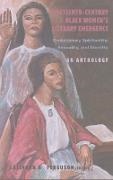Condividi
Fr. 140.00
SallyAnn H. Ferguson, Carlyle V. Thompson
Nineteenth-Century Black Women's Literary Emergence - Evolutionary Spirituality, Sexuality, and Identity- An Anthology
Inglese · Copertina rigida
Spedizione di solito entro 2 a 3 settimane (il titolo viene stampato sull'ordine)
Descrizione
Since her forced migration to the United States, the African American woman has consciously developed a literary tradition based on fundamental evolutionary principles of mind and body. She has consistently resisted attempts by patriarchs and matriarchs alike to romanticize and redefine that biologically-based literary heritage. This volume of ten classic texts, including such nineteenth-century writers as Jarena Lee, Harriet Jacobs, and Angelina Grimké, documents for teachers and general readers how African American female self-portraits gradually crystallized over some three centuries of brutality imposed by white men and their surrogates, who legally raped and then branded her immoral, precisely because she was black and female. This anthology also explores how her literary features were further defined during the postbellum era of Jim Crow segregation and civil rights abuses. Readers cannot adequately understand this woman's unique story without learning how and, more importantly, why mental and physical atrocities so gruesome that most people cringe to think of them were inflicted upon her black female self in this land.
Sommario
Contents: Introduction: "Evolutionary Sexuality, Spirituality, and Identity: 19th-Century Black Women's Literary Emergence" - Maria W. Stewart (1803-1879): Religion and the Pure Principles of Morality, the Sure Foundation on Which We Must Build (1831) (Short Essay) - Jarena Lee (1783-?): The Life and Religious Experiences of Jarena Lee, A Coloured Lady, Giving an Account of Her Call To Preach the Gospel. Revised and Corrected from the Original Manuscript, Written by Herself. (1836) (Short Spiritual Narrative) - Harriet E. Adams Wilson (1828?-1863?): From: Our Nig : or, Sketches from the Life of a Free Black, in a Two-Story White House, North, Showing That Slavery's Shadows Fall even There. By "Our Nig" (1859) (Short Novel) - Harriet A. Jacobs (1813-1897): From: Incidents in the Life of a Slave Girl, Written by Herself (1861) (Fugitive Slave Narrative) - Elizabeth Keckley (1818?-1907): From: Behind the Scenes: Elizabeth Keckley, Formerly a Slave, but More Recently Modiste, and Friend to Mrs. Abraham Lincoln, or, Thirty Years a Slave, and Four Years in the White House (1868) (Short Postbellum Slave Narrative) - Frances E. Watkins Harper (1824-1911): "The Two Offers" (1859) (Short Story) - Charlotte L. Forten Grimké (1837-1914): "Life on the Sea Islands" (May and June, 1864) (Short Essay) - Anna Julia Cooper (1858-1964): "Womanhood a Vital Element in the Regeneration and Progress of a Race" From A Voice from the South (1892) (Short Essay) - Ida B. Wells-Barnett (1862-1931): Southern Horrors: Lynch Law in All Its Phases (1892) (Short Essay) - Angelina Weld Grimké (1880-1958): Rachel: A Play in Three Acts (1920) (Short Play).
Relazione
"'Nineteenth-Century Black Women's Literary Emergence' invites scholars of the humanities to wake up and smell the Darwinian aroma wafting off of some of their most intellectually challenging themes. In this work SallyAnn H. Ferguson presents a provocative thesis. Women of African descent were subjected to slavery, rape, and ideological derision throughout American history, in part due to deeply ingrained biological imperatives within European American men. While this notion is not unfamiliar to students of evolutionary biology and human behavior, it is surprising to see this perspective arising 'de novo' within the spiritual writings of African American women. Dr. Ferguson demonstrates the startling parallels between the claims of these spiritual writings and ideas central to social subordination theory. This conclusion cannot help but spawn important new examinations of the literary history of African American women as well as more general studies into the social biology of oppression." (Joseph L. Graves, Jr., Dean, University Studies, and Professor of Biological Sciences, North Carolina A&T State University; Fellow, American Association for the Advancement of Science)
"SallyAnn H. Ferguson's 'Nineteenth-Century Black Women's Literary Emergence' collects some of the most important writings by African American women in the nineteenth and early twentieth centuries. By framing these texts within a discourse of Afrocentric evolutionary theories, she provides readers with a provocative new lens through which to analyze the African American woman writer's resistance to the ethnocentric colonizing of her mind and body for 'scientific' purposes. This collection is sure to stimulate debate among scholars and challenge all of us to reread these texts with a new consideration for their ability to challenge conventional ideas about evolutionary theories." (Sharon M. Harris, Professor of English, University of Connecticut, Storrs)
Dettagli sul prodotto
| Con la collaborazione di | SallyAnn H. Ferguson (Editore), Carlyle V. Thompson (Editore) |
| Editore | Peter Lang |
| Lingue | Inglese |
| Formato | Copertina rigida |
| Pubblicazione | 03.03.2008 |
| EAN | 9781433101588 |
| ISBN | 978-1-4331-0158-8 |
| Pagine | 306 |
| Dimensioni | 160 mm x 22 mm x 230 mm |
| Peso | 710 g |
| Serie |
African-American Literature and Culture |
| Categorie |
Narrativa
> Romanzi
Scienze umane, arte, musica > Scienze linguistiche e letterarie > Letteratura / linguistica inglese |
Recensioni dei clienti
Per questo articolo non c'è ancora nessuna recensione. Scrivi la prima recensione e aiuta gli altri utenti a scegliere.
Scrivi una recensione
Top o flop? Scrivi la tua recensione.

